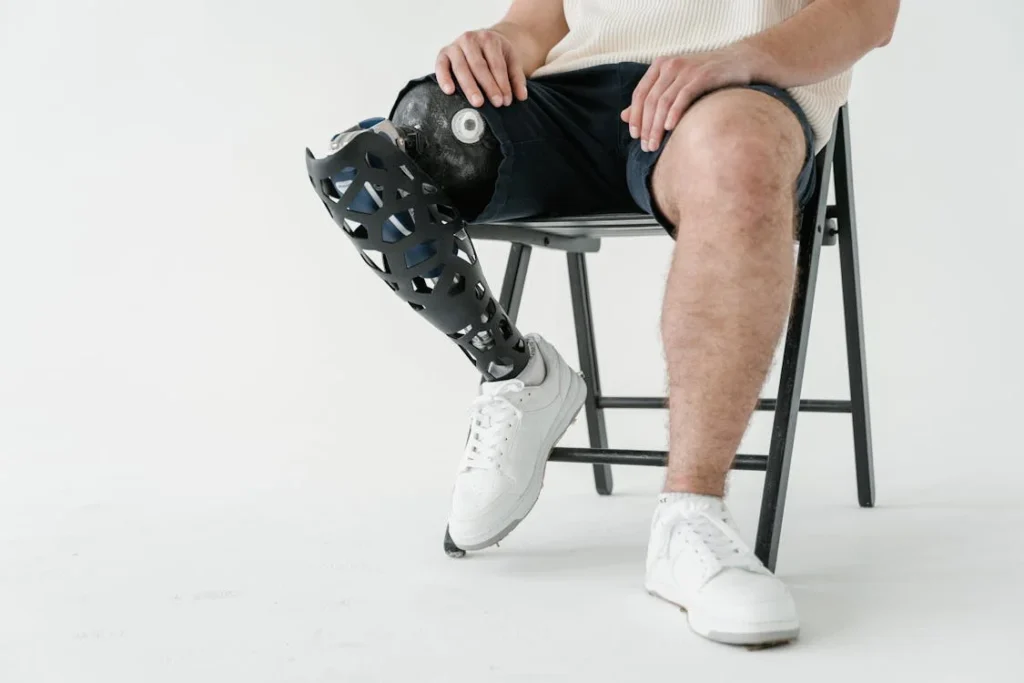Losing a limb changes your life. There’s no easy way to say it. Whether it’s your arm or leg, whether it happened suddenly or after years of illness, the journey ahead is not just about physical healing. It’s also deeply emotional. And one of the hardest parts of this journey? Talking to the people you care about most—your family, your friends, your partner—about what you’re going through.
You might feel like you need to stay strong for them. Or you might worry that they won’t understand. Maybe you’re scared of how they’ll react. Will they look at you differently? Will they pity you? Will they avoid talking about it altogether?
These fears are normal. You’re not alone in feeling them. At Robobionics, we’ve walked alongside many people navigating life after amputation. And one thing we’ve learned is this: open, honest conversations can ease the weight you’re carrying. But starting those conversations? That’s the tricky part.

Understanding What You’re Feeling
Before you can talk to others about your amputation, it’s important to check in with yourself first. You’ve gone through a major change, and that comes with a wide range of emotions. Some days might feel okay. Others might feel like everything’s falling apart. This is not just expected—it’s completely valid.
Accepting the Emotional Rollercoaster
Right now, you might feel sad, angry, scared, or even numb. You might feel all of these in one day. And that’s okay. There’s no right way to grieve the loss of a limb.
Some people feel relief after surgery, especially if it ended years of pain. Others feel a deep sense of loss. Most feel a mix of everything.
Talking to your loved ones will be easier once you understand and accept what you’re going through. So take a moment to breathe and be honest with yourself.
You don’t need to have all the answers. You don’t need to be okay every day. But recognizing your feelings is the first step toward sharing them.
You Don’t Owe Anyone Perfection
One of the heaviest burdens people carry after an amputation is the feeling that they need to be strong all the time.
You might think you should put on a brave face for your family, or that you shouldn’t cry in front of your friends. But trying to be perfect only adds more pressure.
You are human. This is hard. And you’re allowed to be vulnerable. In fact, letting your loved ones see that you’re struggling a little can make them feel more comfortable showing up for you. It invites them to be human, too.
You don’t need to share every thought or feeling. But you don’t need to hide them either. The people who love you want to support you—but they need to know how. And that starts with being real with yourself.
When Is the Right Time to Talk?
You might be wondering, “When should I bring this up?” The truth is, there’s no perfect time. But there are better times than others.
Right after surgery, you might still be in pain or dealing with medications that affect your mood or clarity. It’s okay to wait until you’re feeling more stable. At the same time, don’t wait too long if you feel the weight of silence getting heavier.
Start when you feel ready. Not when someone else tells you to. Not because you think you should. But because you feel it’s time to open that door.
The goal isn’t to have a polished speech. It’s to start a real, honest conversation.
Creating a Calm Space
The setting matters. Choose a quiet, private place where you feel safe. You might want to start with one person you trust before talking to a larger group. Maybe it’s your spouse, your parent, or your closest friend.
Try not to have this conversation when everyone’s busy, distracted, or stressed. It’s worth waiting until you feel like there’s space for a real exchange—not just a quick chat.
You can start small. A simple “Can we talk for a few minutes?” is often all you need to begin.
How to Start the Conversation
This part can feel like standing at the edge of a cliff. You know you need to jump in, but your feet won’t move. So let’s break it down into smaller, more manageable steps.
Start With How You Feel
One of the best ways to open up is by being honest about your emotions. You can say something like:
“I’ve been thinking a lot about everything that’s happened. It’s been hard to put into words, but I want to try.”
Or:
“This hasn’t been easy for me, and I know it might be hard for you too. But I think it’s important we talk about it.”
You don’t need to be perfect. You just need to be real.
Give Them Permission to Be Honest Too
Many times, loved ones don’t know what to say. They’re afraid of saying the wrong thing, so they say nothing at all. Or they pretend everything is normal when it clearly isn’t.
You can help by creating space for them to speak, too. You might say:
“I know this might be awkward, and I don’t expect you to have all the right words. But I’d rather we talk than avoid it.”
This shows them that it’s okay to be unsure or emotional. It reminds them that they don’t need to walk on eggshells around you.
Talk About What You Need
Sometimes, people want to help but don’t know how. So they guess. They offer solutions when you just need to talk. Or they smother you when you need space.
This is where being clear helps. You can tell them what helps and what doesn’t. You can say:
“I really appreciate you being here. Right now, I just need someone to listen.”
Or:
“It’s okay if you don’t know what to say. Just sitting with me helps more than you know.”
This sets expectations without pressure. It also gives your loved ones a role in your healing process.

Navigating Difficult Reactions
As much as we hope for love and understanding, the reality is that not everyone knows how to respond to big changes like amputation. Some people might surprise you with kindness.
Others might struggle with awkwardness, fear, or even silence. It’s not because they don’t care. Often, it’s because they’re unsure of how to show it.
Preparing for a Range of Emotions
When you tell someone about your amputation, you may notice different kinds of reactions. Some might cry. Some might try to make jokes to lighten the mood.
Others might avoid eye contact or change the subject. Some may ask a lot of questions, while others may stay completely silent.
All of these reactions are normal. Everyone processes tough news in their own way. Your loved ones may be hurting too—not because of what you did, but because they care and they don’t want to see you in pain.
You might even encounter someone who says something clumsy or hurtful. Maybe they ask an insensitive question.
Or maybe they compare your situation to something that feels off. Remember, most people are not trying to be unkind. They’re just scared or confused, just like you might be.
Giving Others Room to Process
It’s important to give your loved ones time and space to process their feelings. You’ve had time to sit with your experience.
They may be hearing about it for the first time. Let them have their own emotional journey, just like you’re having yours.
You might say:
“I know this is a lot to take in. You don’t have to say anything right now. I just wanted to share this with you.”
This gives them the gift of time. It tells them that you’re not expecting a perfect reaction, just a human one.
Boundaries Are Okay
While it’s helpful to be patient with others, it’s also okay to protect your own emotional space. If someone is being too negative, making it about themselves, or pushing you to talk before you’re ready, it’s okay to set a boundary.
You can say:
“I’m not ready to talk about that right now.”
Or:
“I appreciate your concern, but I need a little space right now.”
Boundaries aren’t about pushing people away. They’re about giving yourself the care you need to heal in a healthy way.
Talking to Children
If you have kids in your life—your own or in your family—you may feel extra anxious about explaining your amputation to them.
Children see the world differently. They’re curious, honest, and often more accepting than we expect. But they also need simple, clear, and gentle explanations.
Use Simple, Honest Words
Kids can usually handle more than we give them credit for. What matters most is how you say it.
You might say:
“The doctors had to take off part of my leg/arm to help me get better.”
Or:
“My body wasn’t working the way it needed to, so they removed that part to help me stay healthy.”
Try to avoid scary words or too much detail. Let their questions guide how much you share. Some children might ask right away. Others might need time.
Reassure Them
Children often worry silently. They might not say it, but they may wonder if you’re in pain, or if they’ll lose you. Reassure them:
“I’m still me. I’m okay. And I’m here for you.”
Let them know you’re still their parent, uncle, aunt, or grandparent. Show them love the same way you always did. Hugs, play, stories—those little things matter more than big explanations.
If you’re using a prosthetic, it can help to explain it simply. Maybe even show them how it works. Kids are naturally curious. If you invite them into the experience, it becomes less scary and more interesting.
How to Talk to a Partner or Spouse
Talking to a spouse or partner may be one of the hardest conversations you’ll ever have about your amputation. This person knows you intimately.
You might worry about how they’ll see you now—emotionally, physically, sexually. These fears are deeply personal and very real.
Be Honest About Your Fears
You might be afraid they won’t find you attractive anymore. Or that your relationship will change. You may feel like a burden, even if they’ve never made you feel that way.
Say it out loud. Let them in.
“I’m scared about how this might change things between us.”
That kind of honesty can be the beginning of a deeper connection. Vulnerability is not weakness—it’s strength. It invites your partner to be honest too.
Let Them Share Their Feelings
Your partner may also be scared. Not because of you, but because they don’t want to see you hurting. They may worry about saying the wrong thing. Or they may be grieving in their own way.
Make space for both of you. You don’t need to solve everything in one conversation. But you do need to keep talking.
“I know this is hard on both of us. Let’s figure it out together.”
Let that be your foundation.

Rebuilding Trust and Connection After the Talk
After you’ve opened up to your loved ones, there’s often a sense of relief—but also a lingering uncertainty. What happens now? How do you keep the conversation going, and how do you strengthen the relationships around you?
It’s not just about one big talk. It’s about what follows.
Keep the Dialogue Open
Think of your first conversation as the beginning, not the end. The more you talk, the easier it becomes. You don’t need to rehash the hard parts every day, but staying open helps your relationships grow stronger over time.
You might share small updates. Talk about how you’re adjusting to your prosthetic. Mention what’s challenging and what’s improving. This helps others feel included, and it helps you feel less alone.
Sometimes, silence can creep back in—not because people don’t care, but because they’re unsure of how to follow up. You can gently keep the door open:
“Thanks for asking how I’m doing today. It means a lot.”
Or even:
“I’m still figuring things out, but it helps to talk about it sometimes.”
Small moments of connection matter. They build trust and remind everyone that healing isn’t something you do in isolation.
Let People Show Up for You in Different Ways
Support doesn’t always look the same. Some people may call or text you regularly. Others may bring food, run errands, or just sit quietly beside you. Some may make you laugh when you need it most.
Not everyone will say the perfect words. But if someone is showing up in their own way, try to recognize it. Often, people express love not through grand speeches, but through small actions.
If someone is unsure of how to help, you can guide them. Saying something like:
“Would you mind coming with me to my next appointment?”
Or:
“I’d love it if you could spend some time with me this weekend. I’ve been feeling a little low.”
These invitations give people a role. And many are just waiting for the chance to be there for you.
Your Story Can Strengthen Bonds
There’s something powerful about shared vulnerability. When you talk openly about your amputation, you’re not just sharing information—you’re sharing your story. And stories bring people closer.
You may find that your loved ones open up about their own struggles. They may tell you things they’ve never said before. Pain has a strange way of deepening empathy. And that can lead to a kind of closeness that’s more real than ever before.
This doesn’t mean everything will be perfect. There may still be misunderstandings. There may still be distance with certain people. But for many relationships, these conversations are the beginning of something new—something stronger.
Addressing Your Own Changing Identity
One of the hardest parts of life after amputation isn’t what happens on the outside—it’s what happens inside. You’re not just learning how to move differently. You’re learning how to see yourself differently.
And that affects how you talk to others, too.
You Are Still You
You might feel like you’ve lost a part of yourself. And in many ways, you have. But you’re also still here. You still have your mind, your heart, your humor, your values. You still love the same people. You still dream, hope, and care.
When you talk to loved ones, you don’t need to act like nothing’s changed. But you also don’t need to act like you’re a different person.
It’s okay to say:
“I’m still figuring out who I am after this.”
That’s honest. That’s real. And it helps your loved ones understand that identity isn’t fixed—it’s something you grow into.
Redefining Strength
For many, the word “strength” used to mean being physically capable. But after amputation, strength often takes a new form. Now, it might mean asking for help. Or admitting that you’re scared. Or getting out of bed on a tough day.
Your loved ones may admire you in new ways. Not because you’re pretending everything is fine, but because you’re facing reality with courage.
And the more you share your evolving view of strength, the more others will see it too. This helps shift the focus from what was lost to what is still being built.
When Conversations Don’t Go Well
No matter how prepared you are, not every talk will go the way you hope. Some people may withdraw. Others may say the wrong thing. A few may avoid the subject altogether. And yes, some relationships might even change or fade.
That’s a painful reality—but it doesn’t mean you did anything wrong.
It’s Not a Reflection of Your Worth
People react based on their own fears, habits, and emotional capacity. If someone pulls away, it’s often about them, not you. You’re still worthy of love, respect, and connection—even if someone in your life can’t show up the way you need.
It’s okay to grieve those changes. It’s okay to feel angry or let down. Let yourself feel that, and don’t rush to “fix” things right away.
Sometimes, people need time to come around. Sometimes, they won’t. Either way, you have the right to surround yourself with those who uplift and support you.
Focus on the Ones Who Stay
In the wake of any major life event, your circle may shift. Some people will step up in ways you never expected. They’ll listen, support, and love you through the ups and downs.
Those are the connections worth nurturing. Pour into the people who pour into you. Let go of the need to chase those who can’t meet you where you are.

Rebuilding Social Confidence and Public Comfort After Amputation
Once you’ve had personal conversations with your loved ones, a different challenge often begins—facing the world outside your close circle.
Going out in public after an amputation can feel like stepping into a spotlight you didn’t ask for. Strangers stare. Some whisper.
Others avoid looking at you altogether. The energy is different. And that shift can deeply impact your confidence.
Let’s explore how to rebuild your social comfort from the inside out.
The Feeling of Being Seen Differently
You may notice that people treat you differently now, even if they don’t mean to. Some might try too hard to be nice.
Others might talk to the person you’re with instead of addressing you directly. And yes, you might get those long, quiet stares in public places.
This isn’t in your imagination. It happens. And it can feel exhausting. You may start to wonder: “Is everyone looking at me because I have a prosthetic? Because I’m in a wheelchair? Because I look different now?”
That kind of over-awareness can steal your energy and peace. It can make you want to avoid going out altogether. But staying home too long creates its own kind of pain—loneliness.
So how do you reclaim your space in the world?
Small Steps Back Into the World
One powerful way to ease back into social settings is by choosing familiar, low-pressure environments first. A quiet café. A visit to a friend’s home. A walk in a park during off-peak hours. Start where you feel most in control.
At first, even a short outing can feel overwhelming. But each time you go out and return safely, you’re proving to yourself that you can do it. And with time, it becomes easier.
Wear what makes you feel confident. If you use a prosthetic and you’re still adjusting to how it looks, you don’t have to reveal it right away.
Cover it if you want. Or show it proudly if that empowers you. There’s no “right” way to present yourself—it’s all about your comfort.
When People Ask Questions
People are curious. Sometimes in good ways, sometimes in clumsy ones. You may hear things like:
- “What happened to you?”
- “Did you lose your leg in an accident?”
- “Wow, is that thing robotic?”
These moments can catch you off guard. But remember—you don’t owe anyone an explanation. You can answer if you want. Or you can smile and move on.
Try preparing one or two short replies that you feel comfortable using. This gives you a sense of control when surprises come your way. For example:
“It’s a long story, but I’m doing well now—thanks for asking.”
Or:
“I’m just out enjoying the day like you are.”
These responses set gentle boundaries without sounding defensive. They remind people that you’re a person first—not just a medical story.
Finding Your New Normal in Social Spaces
As you grow more comfortable, your world will expand again. You’ll start to notice something shift inside you. The glances won’t bother you as much.
The questions won’t rattle you. You’ll begin to walk—or roll—through life with a steadier sense of self.
Social confidence after amputation isn’t about pretending to be fearless. It’s about building real comfort in your own skin, one interaction at a time. It’s about reconnecting with your identity, beyond your physical changes.
And most of all, it’s about reminding yourself, and the world, that your presence still belongs in every room, every space, every conversation.

Dealing With Internalized Shame and Reclaiming Self-Worth
Talking to loved ones about your amputation doesn’t just mean explaining what happened. Sometimes, it means confronting something deeper—something silent and hidden: shame.
It’s the quiet, heavy feeling that whispers, “I’m not whole anymore,” or, “I don’t want to be seen like this.”
Let’s talk about that voice. And let’s dismantle it.
What Is Internalized Shame?
Shame is different from sadness or fear. Sadness says, “This hurts.” Fear says, “I’m worried about what might happen.” But shame says, “There’s something wrong with me.” It attacks your identity, your worth, your sense of belonging.
After an amputation, shame can show up in subtle ways. You might feel hesitant to look at yourself in the mirror.
You might avoid intimacy, even emotional closeness, because you’re scared of being “too much” for someone else to handle.
You might even push people away—not because you want to, but because you’re afraid they’ll reject you first.
And here’s the truth: these thoughts are lies. Powerful lies, yes—but lies nonetheless.
Where Shame Comes From
Shame doesn’t come out of nowhere. It often grows from what we’ve been taught to believe: that strength means being whole, that beauty means symmetry, that value means independence.
Society often reinforces those beliefs without even realizing it. Think about how movies and media portray disability—often as something to pity or “overcome.” So it’s no surprise if part of you has internalized those ideas, too.
But you are not a broken version of your old self. You are not “less than.” You are still here, still human, still worthy of respect and dignity.
The loss of a limb doesn’t define you. But how you treat yourself in the aftermath does shape how you move forward.
Bringing Shame Into the Light
Shame thrives in silence. The more we hide it, the stronger it becomes. That’s why talking about it matters—not just with loved ones, but with yourself.
When you name the shame, you take away some of its power.
Say it out loud, if you can:
“I feel embarrassed about how my body has changed.”
Or:
“Part of me is scared people won’t love me the same way.”
Now take a breath.
Then remind yourself:
“Feeling this way doesn’t make me weak. It makes me human.”
The act of acknowledging these feelings without judgment is an act of healing.
Sharing Shame Safely
You don’t need to spill your deepest feelings to everyone. But finding one safe person—a therapist, a close friend, a support group—can help you carry the weight.
When you share your shame, you invite compassion. You make space for someone to say, “Me too,” or “You’re still you,” or simply, “I’m here.” That response, however small, chips away at the lie that you’re alone.
Even with family, just saying something like:
“I’m still struggling with how I see myself now.”
…can open a door.
You’re not asking for pity. You’re asking to be seen.
And you deserve to be seen—not just as someone who survived, but as someone who still matters.
Reclaiming Your Story
Shame often makes you feel like your amputation is your whole story. But it’s just one part. Your story also includes your resilience. Your sense of humor. The people you’ve loved. The dreams you’re still chasing.
Start telling that story—first to yourself, then to the world. Even if your voice shakes at first.
Talk about the time you cried with relief after taking your first steps with a prosthetic. Talk about how hard it was to dress up for the first time post-surgery—and how you did it anyway.
Talk about how your pain gave you a new kind of strength that no one sees on the outside.
Because the more you speak, the less room shame has to live.
And the more you tell your truth, the more you become free.

Turning Your Experience Into Advocacy and Empowerment
At some point in your healing journey, you may begin to feel a shift. The conversations with loved ones get easier.
The stares bother you less. And then one day, a thought might cross your mind: “Maybe I can help someone else going through this.”
That’s when your story begins to evolve—not just as something to endure, but something to offer.
Talking about your amputation with loved ones can be a stepping stone toward something even greater: becoming a voice for those who haven’t yet found their own.
From Survivor to Advocate
You don’t need a big platform, a huge social media following, or a public speaking background to be an advocate.
Advocacy starts in small, quiet places. It starts when you answer a message from someone going through surgery next week.
It begins when you visit a friend of a friend who’s feeling scared. It happens when you simply say, “I understand.”
Your voice carries weight. Not because it’s perfect, but because it’s real. And for someone in the early days of amputation—confused, hurting, afraid—your words might be exactly what they need to hear.
You’re not just talking about medical facts or recovery timelines. You’re giving hope. You’re giving someone a vision of life beyond the pain. You’re showing that survival is possible—and so is living.
Healing Through Helping
You may be surprised how much healing happens when you reach out to help others. It gives your experience meaning. It shifts the focus from what was taken to what can now be given. That shift can be deeply liberating.
For many amputees, becoming a peer mentor, a support group leader, or even just a compassionate listener, helps rebuild their own confidence and sense of purpose.
You’re no longer defined by your loss. You’re now part of someone else’s healing.
That doesn’t mean you stop having hard days. It means those hard days can now serve a purpose beyond just pain.
You might say to someone:
“I don’t have all the answers, but I know what it’s like to sit in your shoes. And I’m here.”
Sometimes, that’s more powerful than any doctor, any article, any motivational quote.
Finding the Right Space for Your Voice
Advocacy doesn’t look the same for everyone. You might feel most comfortable writing about your experience. Others may thrive speaking in groups. Some may quietly support people in their local community or hospital.
If you’re in India, like many of our clients at Robobionics, you might find a deep need for visibility and education around limb loss.
Many still carry stigma. Many suffer in silence. You can help change that, one conversation at a time.
Start by asking:
- What helped me when I was struggling?
- What do I wish someone had told me sooner?
- Where can I show up for someone else now?
Even just sharing your story in a blog, a video, or a chat with a stranger can be a powerful act of resistance against shame—and a step toward changing perceptions.
Empowerment Is a Lifelong Process
The truth is, empowerment doesn’t happen all at once. It’s not a switch you flip after you’ve “healed enough.” It happens in layers. Some days, you’ll feel brave and strong. Other days, you’ll feel tired and unsure.
That’s okay. Empowerment is about choice. It’s about choosing to show up, to speak, to connect—when you can, how you can.
You’ve gone through something unimaginable. And yet, here you are—still reaching, still growing, still connecting. That in itself is a radical kind of strength.
By choosing to talk about your amputation, not just with loved ones but with the world around you, you’re doing something bold. You’re breaking silence. You’re reshaping identity. You’re creating space for others to be seen.
And in doing so, you’re not just surviving your story. You’re rewriting it.
Conclusion
Talking to loved ones about your amputation isn’t just about explaining what happened—it’s about reconnecting, rebuilding, and reclaiming your place in the world. It’s a journey of honesty, vulnerability, and deep inner strength. You don’t need perfect words. You only need real ones.
There will be moments of silence, discomfort, maybe even misunderstanding. But there will also be moments of closeness, support, and powerful love. These conversations can be hard—but they can also be healing.
You are not defined by what you’ve lost. You are shaped by how you choose to move forward. And every time you speak your truth, you remind the people around you—and yourself—that your story is still being written. One honest word at a time.
You’ve got this. And you’re not alone.



